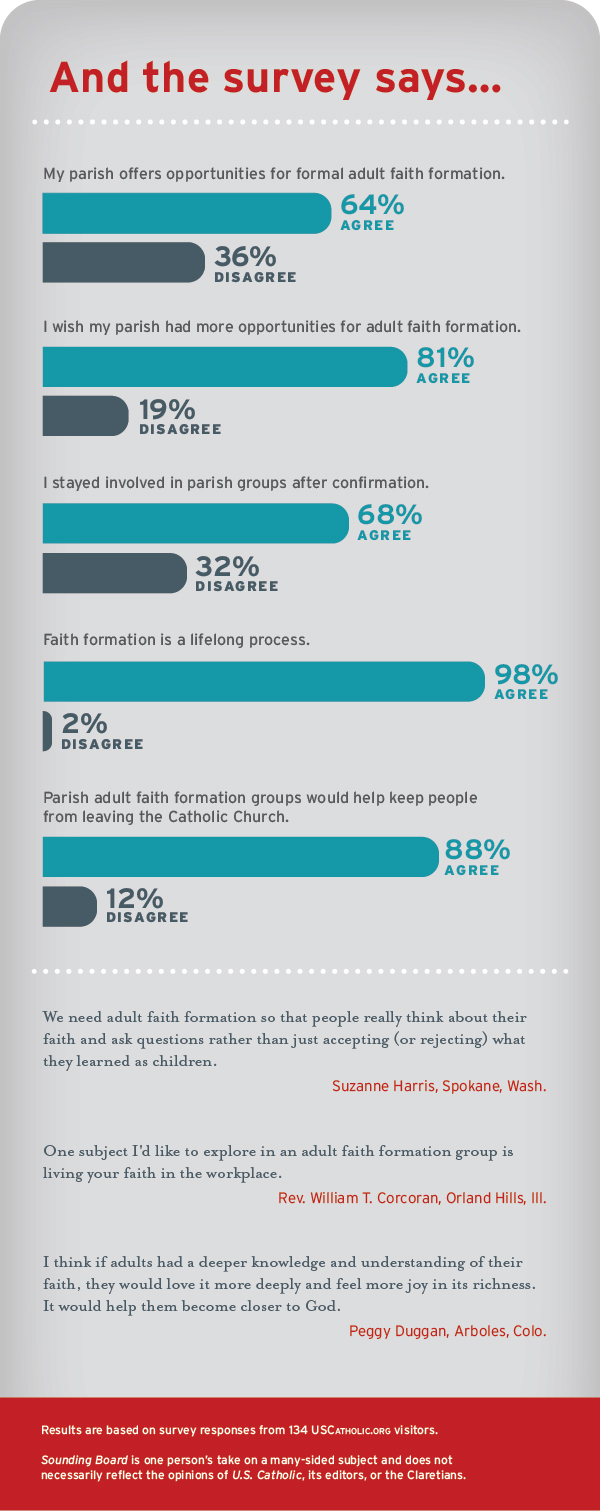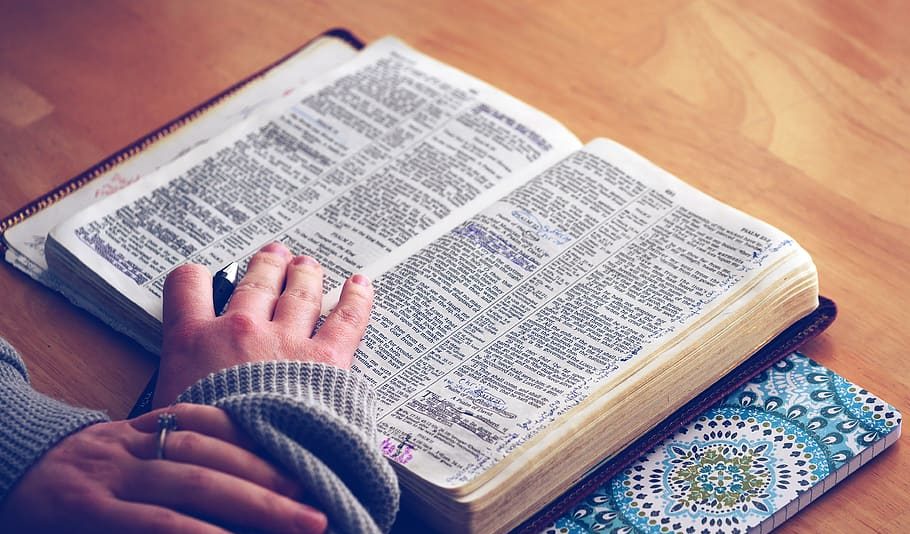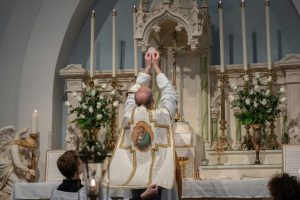The very first Mass I attended scared and confused me so much I’m still surprised I went back. I was about 16 and it was a LifeTeen Mass at the local cathedral: lights dimmed, incense, and a lot of standing, kneeling, and responsive prayers that were foreign to my unchurched self. Yet the mystery and reverence surrounding the Eucharist at that Mass later combined with the irresistible witness of liberation theology, and I found myself a Catholic convert as a sophomore in college. I could relate to St. Paul falling from his horse, as I too abandoned all previously held religious beliefs. Somehow today I find myself with 15 years of ministry under my belt.
As a convert, nearly all of my faith formation has been as an adult, yet almost none of it took place in the context of a local parish. I participated in a parish-based Rite of Christian Initiation of Adults (RCIA) program, but most of my real spiritual development happened while conversing with Catholic friends, researching and reading extensively, and finding role models who epitomized the vastness of the body of Christ, such as Dorothy Day, Jon Sobrino, and those involved in antiwar movements and social justice work.
I find it difficult to be engaged in a local parish. At the local parish level, adult faith formation usually feels like an afterthought at best or completely absent at worst. If it’s a small church with mostly elderly parishioners, there likely exists no formation for adults at all. In a bustling parish with lots of families, adults might be invited as onlookers to the Christmas pageant or for informational meetings when their children are preparing for first communion or confirmation.
In other words, most opportunities for faith formation are child-focused, with parents on the periphery and other adults largely excluded. We remind parents that they are their children’s first instructors in the faith without taking the time to make sure they themselves are formed and enriched in their faith lives.
The United States Conference of Catholic Bishops (USCCB) affirmed in its 1971 General Catechetical Directory that “catechesis for adults must be considered the chief form of catechesis.” Either this message did not trickle down or adult catechesis has been tried and failed in the decades since. In 1999 the bishops affirmed their commitment with Our Hearts Were Burning Within Us: A Pastoral Plan for Adult Faith Formation in the United States (USCCB Publishing), in which they acknowledge the difficulties of adult catechesis and offer hope and concrete suggestions to shift the focus. Yet this still hasn’t caught on in most U.S. parishes.
Based on my years on college campuses and in the parish, I am convinced that adult faith formation begins with the ethos and culture of a community. We’ve attempted this in myriad ways in our parish. When our parish council, after seeking input from the larger community, took six months to craft a mission statement that explicitly welcomed the LGBTQ+ community, our pastor took to the pulpit on Epiphany Sunday to explain every word choice in the statement and tie the statement to scripture and church teaching. In short order, I heard from several parishioners who felt relieved that they could claim their authentic selves as both LGBTQ+ and Catholic. We also held an open listening session for the LGBTQ+ community, inviting those who identified as queer and Catholic as well as their families and friends to come share joys and struggles.
Not only was there an eager audience for the event, but numerous parishioners immediately reached out offering to bake goodies or help with setup. As we’ve discussed this issue and been clear about our desire to stand with the marginalized, we have been forming and re-forming the faith of those in the parish and those who joined us as a result of our radical welcome.
It’s not simply coffee hour on Sunday morning. It’s in the celebration of the liturgy, the welcome newcomers receive, and the joy on display by parishioners. When homilies can effectively translate ancient scripture and the life of Jesus for modern-day realities, adults are catechized. When opportunities for sustained and nuanced conversation are not only present but also attractive, we all have the opportunity to share our faith and learn from one another. We have to begin with meeting people where they are on their journey, welcoming them without reservation, and investing in the relationship we all have based on our shared Christian faith.
The bishops point out that a major goal guiding adult education should be inviting and enabling an ongoing relationship with Jesus Christ for all people. After all, what is at the center of our faith isn’t a what—it’s a who. Christian faith is centered on a person, not dogma or doctrine. To embrace faith in Jesus means embracing other people in all their humanity, which is why any attempts to catechize adults must begin in relationship and welcome.
Beginning with relationship can also address some of the major reasons adults, particularly those under the age of 40, leave the parish. The deepening political divides in our country are apparent in the U.S. church. Many adults have left based on political views they are told are incompatible with being Catholic. In fact, the body of Christ is wide enough for all of us. James Joyce famously described the Catholic Church as “here comes everybody,” and that should be the only litmus test extended for membership in our parishes. When we begin with a culture of welcome, we can focus on our relationship with Christ and one another before entering into nuanced conversations on faith and life.
A second goal from the USCCB for effective adult faith formation is to promote and support active membership in the Christian community. This is the heart of stewardship: supporting members to live out their baptismal call and find the sweet spot where their gifts can meet the needs of the community. Beginning with relationship means acknowledging that Sam has a gift for public speaking since he is a teacher and therefore would make a great lector, for example. These relationships also show us what gifts and talents exist in the community for formation that go beyond volunteerism.
Our parishioners are lawyers, teachers, and accountants. They can share experiences of caregiving, child-rearing, and ethical dilemmas that make faith in the real world come alive.
After all, one of the main goals of faith formation is how to be Catholic when you’re not at Mass. All of us are called to read scripture and attempt to apply it to our modern lives. Liberation theology teaches us that all theological interpretation begins with experience. How much richer might our understanding of scripture and tradition be with a plethora of experiences at the table? If the goal is to live out our faith in our everyday lives, then what we do in our everyday lives has to be relevant and celebrated in the context of forming disciples. All are invited to both give and receive and, in the end, celebrate shared ownership of the community church.
Encouraging adults to claim authority for their faith also builds confidence around spiritual issues. When confirmation is framed as graduation from CCD (Confraternity of Christian Doctrine) and we stop catechizing in middle or high school, our understanding of Catholicism often remains at an eighth-grade level, and our parishioners remain children subject to the priest who is the authority on all things spiritual. Instead, when we empower and honor the contributions everyday Catholics can make in mutual formation, confidence builds and people speak more easily and more frequently about their faith.
Expanding our faith formation programs to focus on adults will take resources and communal shifts of energy, but there is great reason for hope in its potential in stemming the exodus from parish life. If we begin with relationships—with Christ and with one another—and shape our churches as welcoming communities where everyone’s gifts are honored as the many parts of the body of Christ, we will sit with a nuanced faith that remains relevant when we leave Mass. And that is a gift to both the church and the world.

This article also appears in the March 2020 issue of U.S. Catholic (Vol. 85, No. 3, pages 45–46). Click here to subscribe to the magazine.
Image: Piqsels cc














Add comment